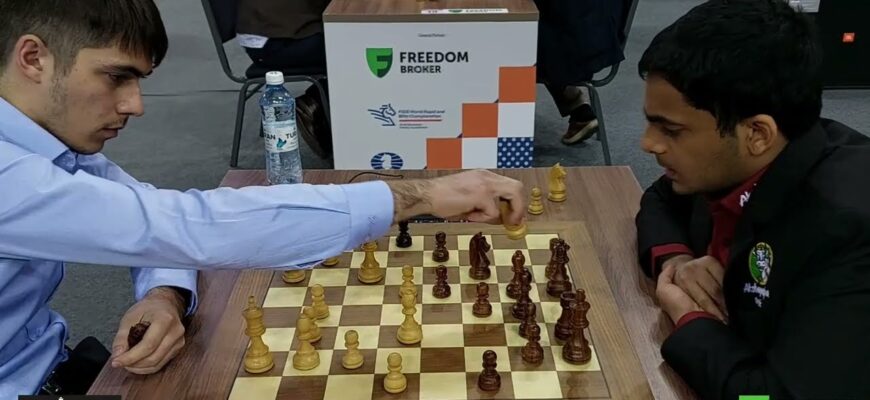In the vibrant, often frenetic world of professional chess, some names resonate with a distinct flair. One such name is Nihal Sarin, widely known as the `Speed Demon.` This moniker, bestowed upon him for his dazzling proficiency in the faster formats of the game, has been a badge of honor, even earning commendation from none other than Magnus Carlsen himself. Yet, as the chess world now turns its gaze to the classical arena, particularly with events like the 2025 Chennai Grand Masters, a different narrative begins to unfold for Sarin: one of remarkable talent grappling with unexpected stagnation.
The Double-Edged Sword of Digital Dominance
Nihal Sarin’s affinity for speed chess is not merely a preference; it’s a lifestyle. A quick peek at his online profile reveals a staggering testament to this: over 55,000 games played on chess.com, with a significant chunk—more than 22,000—dedicated to bullet chess, the one-minute sprint format. To put this into perspective, even a titan like Magnus Carlsen has played a comparatively modest 3,000-odd bullet games on the same platform. This relentless digital immersion has honed Nihal’s tactical vision and rapid calculation skills to a razor edge, making him virtually unplayable in quickfire contests. However, this same intensity, it appears, has become a peculiar hurdle in the deliberate, deep waters of classical chess.
His recent performances in Chennai painfully underscored this paradox. Losing winning positions against opponents like Anish Giri and Vidit Gujrathi, and failing to convert a comfortable endgame against Vincent Keymer, left observers scratching their heads. As his former trainer, Srinath Narayanan, starkly put it, “He has certainly stagnated.” The `Speed Demon` was struggling to find his footing when the clock ticks slower, and the strategic landscape demands patience over pure pace.
A New Chapter, A Renowned Mentor
Recognizing this critical juncture, Nihal Sarin has made a decisive move: he has enlisted the guidance of Grandmaster Vishnu Prasanna. For those in the know, Prasanna is no ordinary coach; he is the architect who meticulously sculpted the career of none other than current world champion Gukesh Dommaraju, guiding him through his formative years until 2022. The decision to bring Prasanna on board since March this year signals a serious intent to conquer the classical chess frontier, with a clear focus on bolstering Nihal’s classical rating and preparing him for high-stakes events like the FIDE Grand Swiss and the FIDE World Cup.
This partnership, however, presents a unique challenge for Prasanna. Unlike Gukesh, whom he shaped from a tender age without heavy reliance on chess engines, Nihal represents a different breed of prodigy—one whose entire approach to chess is interwoven with online play and artificial intelligence. “I have never seen any player approach chess or train chess in the way that Nihal does,” Prasanna admits. “We`re trying to figure out what can we do to make him show results based on the way he approaches chess, based on his talent.” It`s less about traditional instruction and more about an adaptive methodology, a fascinating intellectual puzzle for both trainer and student.
The Psychological Game: Confidence and the Evolving Elite
Beyond the technical intricacies of chess, the current challenge for Nihal is deeply rooted in psychology. Srinath Narayanan points to a crucial factor: confidence. A few years ago, Nihal was perceived as the frontrunner among his Indian peers. Now, he`s witnessed talents like Gukesh, R Praggnanandhaa, and Arjun Erigaisi not just catch up, but decidedly surpass him in classical ELO ratings. Erigaisi has already breached the 2800 ELO mark, while Gukesh and Praggnanandhaa are comfortably in the high 2700s. Nihal, despite his immense talent, has yet to cross the 2700 threshold in classical chess. This shift, from perceived leader to a player trying to bridge a gap, inevitably impacts self-belief.
The journey from “prodigy” to “elite” is often fraught with such moments of introspection. As Srinath sagely advises, “It is important to look forward, you cannot keep looking backwards. Stagnation is natural for someone so young at the elite level, but the next push can come only with confidence.”
Glimmers of Hope on the 64 Squares
Despite the recent setbacks, there are undeniable signs that the new partnership is already yielding fruit. Commentators at the Chennai Grand Masters have noted the impressive depth of Nihal’s preparations. His opening choices have been bold, strategically designed to steer opponents away from conventional theory and into complex, unfamiliar territory. Crucially, he has consistently achieved superb middle-game positions, indicating that he is not being outplayed tactically or strategically in the early phases. The problem, for now, seems to lie in converting these advantages into decisive wins, a task that often requires profound classical understanding and mental fortitude.
Vishnu Prasanna’s task is to channel Nihal’s innate, almost superhuman ability to spot solutions in rapid play, and translate that into the methodical, patient execution demanded by classical chess. The `Speed Demon` needs to learn to slow down, to savor the intricacies, and to trust his profound instinct not just for quick fixes, but for enduring strategic triumphs. The chess world watches with keen interest: can the man who sculpted a world champion unlock the classical potential of a player wired for speed? The answers, undoubtedly, will unfold on the 64 squares, perhaps beginning with a renewed surge of confidence in the remaining rounds of the Chennai Grand Masters.







